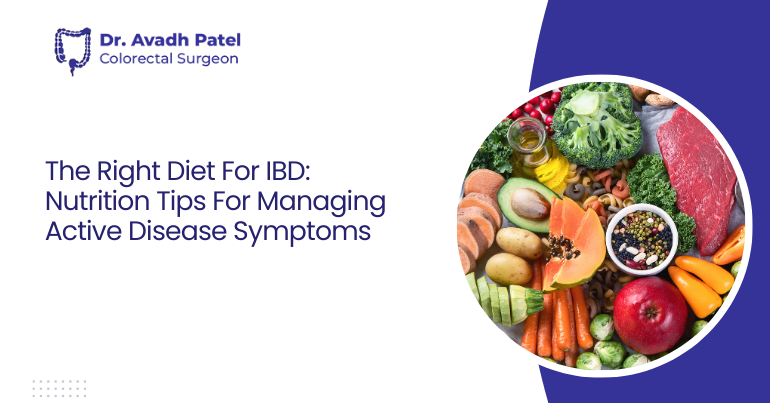Living with IBD or Inflammatory Bowel Disease, such as ulcerative colitis or Crohn’s disease, can be difficult, specifically at the time of flare-ups. When symptoms like diarrhoea, fatigue, abdominal pain, & poor appetite worsen, the best diet for active inflammatory bowel disease becomes extremely essential! While food cannot cure IBD, good nutrition can support your healing journey, ease symptoms and prevent complications.
Here’s A Simple Guide For The Best Diet For Active Inflammatory Bowel Disease!
Choose Low-Fibre, Gentle Foods
Foods that are high in fibre can worsen symptoms as they are a bit difficult to digest. As a replacement, your IBD diet should include soft, low-fibre options such as boiled potatoes, white rice, bananas, and porridge. All these foods are beneficial for your health as they provide energy without irritating the gut. Once the symptoms improve, fibres can be reintroduced slowly.
Prioritise Lean Proteins
Protein is one of the most essential nutrients, as it helps repair tissues and maintain strength, particularly when inflammation levels are high. In such situations, opt for lean sources such as skinless chicken, eggs, fish, paneer, tofu, and other protein-rich options. However, if solid food is hard to tolerate, soups or protein smoothies are good alternatives.
Stay Hydrated – Electrolytes Matter
Persistent diarrhoea can result in dehydration and loss of essential minerals. Therefore, you must sip water throughout the day and include oral rehydration solutions, coconut water, lightly salted soups or buttermilk in your diet. Avoid consuming packaged juices, caffeinated drinks, or soda, as they may irritate your gut health.
Reduce High-Fat And Spicy Foods
Consuming food items that are heavily-spiced, greasy, or fried can worsen the situation and cause painful cramps & diarrhoea. Make sure to have boiled, steamed or lightly sautéed food. Limit the consumption of dairy foods if it triggers discomfort.
Eat Small, Frequent Meals
Instead of having heavy meals three times a day, it’s better to switch to 5 or 6 small yet frequent meals. This helps in reducing pressure on your digestive system and maintaining steady energy levels. During active IBD, your gut tends to function better with smaller portions as it is much easier to break down.
Watch Out For Trigger Foods
A lot of foods generally trigger symptoms like raw vegetables, seeds, nuts, caffeinated drinks, whole grains, high-sugar snacks and legumes with skin. Having a proper diet recommended by doctor like Dr. Avadh Patel, who provides the best inflammatory bowel disease treatment in Ahmedabad, can help you to understand what works in favour of you and what doesn’t!
Final Thoughts
Managing IBD at the time of a flare-up is all about choosing an IBD diet that calms down the situation rather than stressing your gut! Consuming food that is low in fibre, provides hydration and is packed with protein, helps you to support your body during the recovery process.
Therefore, always consult your doctor/dietician to provide you the best diet for active inflammatory bowel disease, making sure it provides nutrition, comfort and better gut health in the long-run.

